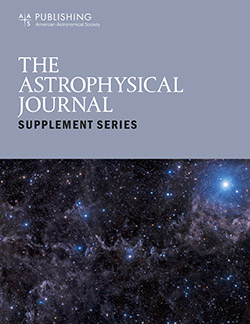pg1159恒星新观测下的GW Vir不稳定带:A72中心星脉动的发现和RX J0122.9-7521的变率
IF 8.5
1区 物理与天体物理
Q1 ASTRONOMY & ASTROPHYSICS
引用次数: 0
摘要
摘要:本文介绍了2014-2022年对29颗PG 1159光谱型前白矮星进行的新的时间序列光度观测结果。对于大多数恒星,在傅里叶振幅谱中,噪声的中位数达到0.5-1.0 mmag。这使得我们能够探测到行星状星云A72 (Abell 72)中心恒星的脉动,与GW Vir恒星激发的g模式一致,以及RX J0122.9-7521的变化,这些变化可能是由于脉动、双星或旋转引起的。对于样本中未观察到变化的其余恒星,我们设置了变异的上限。结合文献数据,我们的结果将脉动PG 1159恒星在GW Vir不稳定带内的比例确定为36%。提供了所有已知的PG 1159恒星的更新列表,其中包含了最近盖亚DR3数据的天体测量数据,以及物理参数,变变性和氮含量的信息。这些数据被用来计算所有PG 1159恒星的光度,从而首次将整个样本放在理论的赫茨普龙-罗素图上。本文将脉动恒星作为一个整体进行了讨论,并提出了传统的“DOV”和“PNNV”恒星中GW Vir脉动星的分离具有误导性,不应使用的论点。本文章由计算机程序翻译,如有差异,请以英文原文为准。
The GW Vir Instability Strip in Light of New Observations of PG 1159 Stars: Discovery of Pulsations in the Central Star of A72 and Variability of RX J0122.9–7521
Abstract We present the results of new time-series photometric observations of 29 pre–white dwarf stars of PG 1159 spectral type, carried out in the years 2014–2022. For the majority of stars, a median noise level in Fourier amplitude spectra of 0.5–1.0 mmag was achieved. This allowed the detection of pulsations in the central star of planetary nebula A72 (Abell 72), consistent with g modes excited in GW Vir stars, and variability in RX J0122.9–7521 that could be due to pulsations, binarity, or rotation. For the remaining stars from the sample that were not observed to vary, we placed upper limits for variability. After combination with literature data, our results place the fraction of pulsating PG 1159 stars within the GW Vir instability strip at 36%. An updated list of all known PG 1159 stars is provided, containing astrometric measurements from the recent Gaia DR3 data, as well as information on physical parameters, variability, and nitrogen content. Those data are used to calculate luminosities for all PG 1159 stars to place the whole sample on the theoretical Hertzsprung–Russell diagram for the first time in that way. The pulsating stars are discussed as a group, and arguments are given that the traditional separation of GW Vir pulsators in “DOV” and “PNNV” stars is misleading and should not be used.
求助全文
通过发布文献求助,成功后即可免费获取论文全文。
去求助
来源期刊

Astrophysical Journal Supplement Series
地学天文-天文与天体物理
CiteScore
14.50
自引率
5.70%
发文量
264
审稿时长
2 months
期刊介绍:
The Astrophysical Journal Supplement (ApJS) serves as an open-access journal that publishes significant articles featuring extensive data or calculations in the field of astrophysics. It also facilitates Special Issues, presenting thematically related papers simultaneously in a single volume.
 求助内容:
求助内容: 应助结果提醒方式:
应助结果提醒方式:


